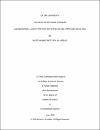ANTIMICROBIAL AND CYTOTOXIC ACTIVITIES OF SELECTED QATARI FLORA
Date
2018-06Metadata
Show full item recordAbstract
Conventional medicine has been challenged by various issues, including drug resistance and safety. On the other hand, Complementary Alternative Medicine has been increasingly gaining the interest of the scientific community and the public for its efficacy and safety. Therefore, the search for cytotoxic and antimicrobial agents from plants has been booming in the last few decades. This study was designed to investigate the anticancer and antifungal activities of the crude extracts (aqueous and organic) from four native Qatari plant species; Aerva javanica, Limonium axillare, Salsola soda and Suaeda vermiculata. The antifungal activity of their crude extracts on the species; Alternaria alternata, Cladosporium sphaerospermum, Fusarium oxysporum, and Botrytis cinerea, was assessed in vitro by two methods; poisoned food and agar diffusion method. While aqueous extracts were not effective, the ethanolic extracts of all plant (aerial parts) were active against all of the tested fungi, and the concentration of 10 mg/ml was enough to inhibit fungal growth. Extracts of L. axillare had the highest activity, with minimal concentration values between 5 and 2.5 mg/ml. The anti-cancer activity of the crude extracts was also assessed on the MCF-7 breast cancer cell line, indicating that with water crude extracts of S. vermiculata at concentrations of 400 and 300 μg/μl were the only effective doses worked against MCF-7 cell proliferation. A comprehensive study is needed to assess the anticancer activity of the S. vermiculata crude extract, using normal human epithelial breast cells and various additional breast cancer cell lines. Last but not least, fractionation will be carried out to identify the bioactive ingredients that are responsible for both anti-cancer and anti-fungal activities.
DOI/handle
http://hdl.handle.net/10576/11202Collections
- Biological & Environmental Sciences [102 items ]


